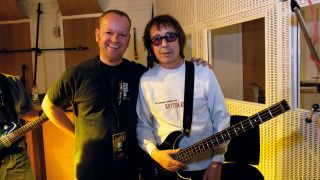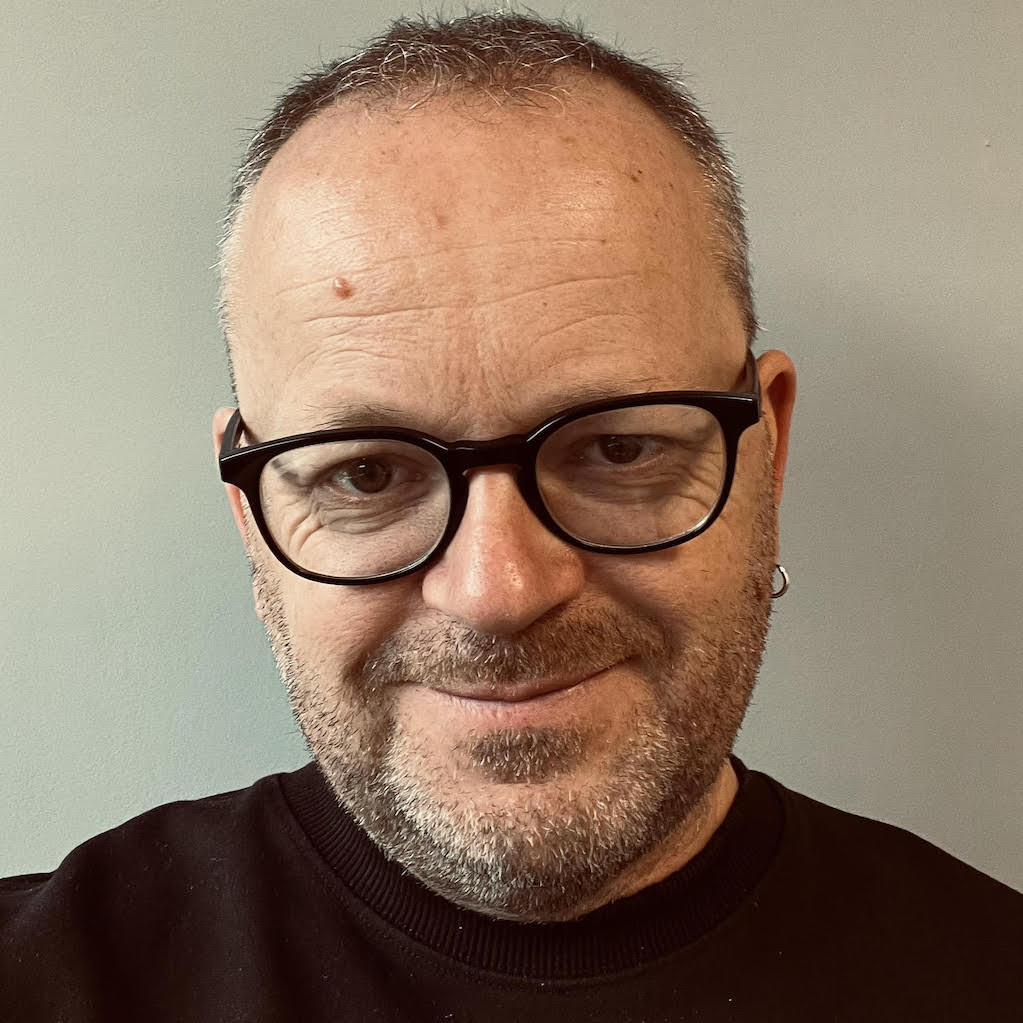This feature originally appeared in Classic Rock 110.
Bruce Kulick isn’t happy. “You’ve learned it in the wrong key!”he groans. It’s Day One. Our band is about to go on stage in five minutes and the only song I’m close to being able to play is Kiss’s Rock And Roll All Nite. But, it turns out, I’ve learned it in A flat. And that’s no use.
The clock is ticking and tempers are short. “Okay, I’ll play bass,” says Bruce, taking the Gibson SG bass off me. “You do backing vocals.” He hurriedly coaches the rest of the band (a drummer, keyboard player and three guitarists) on how to start and where to stop, before suddenly we’re onstage, never having played one note together before, telling an assembled crowd (which just happens to feature former members of Free, Bad Company, Whitesnake, Spencer Davis Group and more) how much we’d like to rock’n’roll all night and party every day.
It’s over before we know it. To be honest, from where I’m standing it doesn’t sound half bad. Now we have an hour or so to get to know each other, rehearse a song that we can all play with Jack Bruce when he gets here, and prepare to go to Abbey Road studios tomorrow to, y’know, lay down some tracks, man.
The only problem? I can’t actually play bass.
The brainchild of David Fishof, a former US sports agent who drifted into the music business when he re-formed The Monkees in 1986 and put together Ringo Starr’s Rock’n’Roll All-Stars back in 1989 (a band that featured, at one time or another, the likes of Jack Bruce, Joe Walsh, John Entwistle, Peter Frampton, Nils Lofgren, Dr John, Rick Danko and Levon Helm of The Band), like all the best ideas, Rock’n’Roll Fantasy Camp is simple. You pay your money (in the case of the London camp, £8,000) and you get to rock’n’roll with the stars. A posse of rock heroes act as ‘camp counsellors’, and for five days coach their own designated group in preparation for a grand finale Battle Of The Bands (in our case at Abbey Road). Meanwhile, guest stars (like Jack Bruce, Bill Wyman and more) arrive to offer encouragement, share stories and jam with each group.
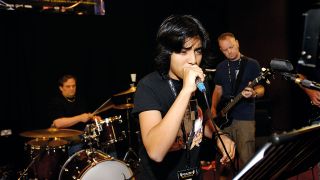
Campers get to learn from the best – pros like Kulick (who in 1977 was playing guitar in Meat Loaf’s Bat Out Of Hell tour and spent 12 years with Kiss) and Spike “fifth member of Queen” Edney or guys with pedigree (Mott/Bad Company mainman Mick Ralphs or Spencer Davis of Gimme Some Lovin’ and Keep On Running fame) – and get to see them jam with the special guest stars in spaces the size of your living room at John Henry studios, the rehearsal rooms to the stars. And then, to add the icing on an already impressive cake, they get to record at Abbey Road (three times – including at least once in Studio 2 where The Beatles recorded) and then play a gig at The Cavern in Liverpool. In-between are masterclasses, all-star jams, and maybe even the odd unscheduled visit from a rock legend or two. As far as holidays go, it beats a week in Skegness.
Fishof claims that anyone can join the camp – no musical experience necessary. When I sign up, he asks me what I can play. I tell him the truth: I can play basic rhythm guitar, but I’m no Rory Gallagher. Shit – I’m no Noel Gallagher. I can maybe sing a bit, and at a stretch could handle some easy bass parts. “You’re playing bass in Bruce Kulick’s band!” he emails straight back. Cool, I think. Until Bruce emails us a list of 12 songs – by The Beatles, Hendrix, Cream – he’d like us to learn in advance. I email the list to a bass player buddy . “Gadzoiks!” he emails back. “Some – I mean all – of those songs are tricky! You’ve got you’re work cut out for you there, mate. Take a tip from Sidney Vicious and don’t turn your amp on…” Arse.
At John Henry, literally an hour after we played our debut performance, Bruce – who resembles a whippet-thin, angsty Gene Simmons, right down to the goatee and maniacal grin – is panicking again. Jack Bruce will be in our room in 20 minutes. And he’s going to play White Room with us.
Jack Bruce is Kulick’s hero. This is serious. He has 20 minutes to break the song down and get the band playing it to an acceptable level. Luckily – as Jack is a bassist – I’m off the hook. Drummer Ed is the only one who professes to know the song well enough to play it. “Okay then,” says Bruce, “how does it start?” Ed plays a few beats. “No, no,” says Bruce.
“Not like that. Where did you get that from?”
“Uh… Ginger Baker?” offers Ed.
“You’re not Ginger Baker,” says Bruce. “This is how I want you to play it…”

The clock ticking, he does this with everyone. “Play the riff. No, not like that, like this. Play it again. Okay.” 14-year-old Mexican wonderboy Yayo Sanchez – who has no idea who Jack Bruce even is – is given the task of filling Eric Clapton’s shoes: “You’re taking the solo.”
“Ssssweeet!” says Yayo.
By the time Jack appears, Kulick has told them how to start and stop, but they haven’t even managed to have one complete run-through of the song. Jack walks in, friendly as you like, looking healthier than ever. “Well,” he says eventually, “shall we have a run through White Room?”
And they do. To an audience of six, Jack Bruce – the Jack Bruce – plugs in and knocks the hell out of the Cream classic. The band, who have never played the song before, are great (and if Yayo is no Clapton, he’s does a good Slash). Kulick, you realise, is some kind of genius.
Afterwards, Jack stays to chat and sign autographs. I introduce myself. “I’m the bass player,” I tell him. “Got any tips for me?”
“Tips?” says Jack. “Yeah: only use the top two strings. And never practise.”
He looks at me: “You Scottish? Where you from?”
“Ayrshire,” I tell him.
“Well you’ll know all about that then,” he says.
“About what?”
“About not practising,” he says. I have no idea what he’s on about.
Over the next few days, we meet, jam with, and have masterclasses from a long line of rock legends. Randy Bachman of Bachman-Turner Overdrive and The Guess Who gives us songwriting tips (each band is asked to write their own song to play at the Battle Of The Bands). Procol Harum’s Gary Brooker talks about 60s London and demonstrates the transcendent power of rock’n’roll by playing a fevered version of Little Richard’s Lucille. Paul Carrack plays Tempted and The Living Years and How Long (backed by Simon Kirke, Neil Murray and Queen/Pretenders dude Jamie Moses) to a room of 40 people. Jon Lord helps our keyboardist, Joan Matthews (an anaesthesiologist from New York) with some keyboard parts for the original song we’re working on.
In-between all that action, we’re holed up in John Henry’s practising, recording in Abbey Road or working on our original song – doing the part of rock’n’roll that magazines don’t write about: the hours in rehearsal rooms; the feedback, false starts, blisters and bum notes. The work, in other words.
Yayo has his own band at home in Austin, Texas, called Rubber Monster and volunteers a song he wrote for them as our original track. It’s great: a riffy, AC/DC-ish rocker. We work on it a bit. The next morning though, he has another he’s just written. It’s brilliant. We work on it for the rest of the afternoon. The drum part is particularly intricate and Ed – the former president of Heinz Seafood Global – is put through his paces by Bruce. I catch him the next morning. “I couldn’t sleep,” he tells me. His head filled with visions of Bruce Kulick teaching him hi-hat patterns, he woke at 5am and wrote out the drum part, practising on the couch in his hotel room. “I’ve got it now though,” he says with a manic stare.
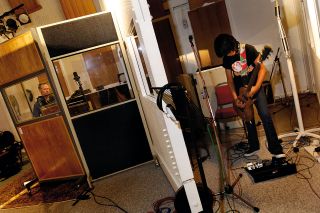
Minutes later, Yayo arrives. “I’ve written another song,” he says. “We should definitely do this one.” Not realising how close he is to being brutally murdered, he plays the new song. It’s awesome, with a brooding John Lee Hooker-plays-Gimme Shelter intro that builds to a head-ripping, Metallica-style chorus. Ed shrugs and smiles. Yayo’s right. This is the one. Arse. Better get practising, then.
We’re playing three songs for the Battle Of The Bands. The Rolling Stones’ Bitch, The Beatles’ Daytripper and our original. Bitch I can cope with, but I struggle to nail the riff to Daytripper. I’m used to strumming chords: having to force my fingers to pick out McCartney’s fiendish little riff over and over again is harder than I thought it would be. If I get it right once, I’m almost guaranteed to fluff the next one.
Kulick is all over me. “Play it from the D,” he tells me. Having no idea which note is D, I play the riff from a random place. “No, I said ‘D’!” he barks.
“You may as well be talking to me in Japanese,” I tell him. “I don’t know what that means! I don’t know where D is.”
“Well, you should,” he says and then he banishes me to another room to practise.
(David Fishof claims that he tells all the councillors to be tough on the bands. “He doesn’t have to tell me,” says Bruce when I mention it to him later.) We get to Abbey Road and discover that we’re in Studio 2 – the actual studio The Beatles recorded most of their stuff in. In the middle of the floor is an old Steinway grand piano. The same piano that The Beatles used? “I think so,” says our producer for the day. Bruce sits at it and punches out Let It Be while we wander around the enormous room open-mouthed.
Everyone in my band is American, seduced by the idea of meeting Jack Bruce, recording at Abbey Road and playing at the Cavern. John McSherry lives on a horse farm in Ohio and was a fighter pilot until January, flying F-18s for the US Navy. He compares singing and playing guitar at the same time to the first time rookie pilots try and speak while turning and end up literally miles from where they should be. He also teaches us the lingo. ‘Sierra Hotel’ he says, is phonetic alphabet-derived pilot slang for ‘shit hot’. ‘Tango Uniform’ is ‘tits up’. You can guess what ‘Foxtrot Oscar’ is.
Charlie Pierce is a senior exec for an enormous company he’d rather I didn’t mention. A gentle giant who hasn’t been playing for long, Bruce tells him to try and ‘look less white’: he gamely adds a couple of scissor kicks to his power chords. Anaethesiologist Joan has been to four Rock Camps with her husband Jeff. She entered her first camp as a ‘non-musician’ and left as a keyboard player.
“You can spend a lot of money going on vacation and it’s not as good as five days at rock’n’roll camp,” she says. “After the first one we felt like teenagers again. It was life-changing.” Yayo gigs around Austin, where his parents own a chain of Tex-Mex restaurants. He’s a great guitarist, a decent singer, a kick-ass frontman, a decent drummer, and has songs pouring out of him. But it’s not easy being a teenage rock genius: “I suck at lyrics cos I don’t have a big vocabulary,” he says. “And I’m not getting drunk yet or having sex or anything, so that just leaves me with little-kid things to write about…” (Recording vocals in Abbey Road one day, Yayo’s voice breaks. “Hey,” he protests when someone mentions it, “I’m 14!” “What about Michael Jackson?” producer Chris Bolster teases him. “He was cutting records when he was five!” “Your voice doesn’t crack when you’re five,” Yayo shoots back. “I’m 14. I’m still getting fuzz – I’m not there yet!”)
Drummer Ed Johnson, 53, lives in Cincinnatti and is now “in private equity real estate”. Ed’s reasons for coming are a little more involved. Originally from the Chicago area, the band he was in as a teenager played Cream covers and Cream-styled blues rock to crowds of 15-20,000. The singer/guitarist of the band was Ed’s best friend. Ed left the band when he could no longer stand watching his friend destroy himself with heroin. “And not long after that he died,” says Ed. “Overdose. So coming here and playing with Jack Bruce on White Room meant a lot – it was a song we used to play.
“Yayo reminds me of him a lot,” he says, turning and wagging his finger at the kid. “And so if I ever hear of you using that stuff, I swear to you, I’ll track you down…” He’s only half joking.
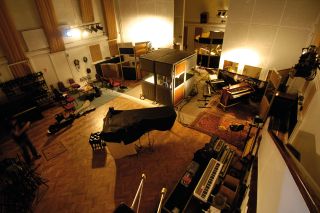
We record Bitch. It sounds, like, bitchin’. Bruce dispatches John to the booth to re-do part of the solo, Yayo gets to re-do a few lines of vocals and we get to see the wonder of Pro-Tools in action. (The following day my ham-fisted attempt at Daytripper is rescued when Pro-Tools Guy finds one of the rare occasions I play the riff correctly and promptly cuts and pastes that riff over all the duff ones. Hurrah!)
Towards the end of the day, Bill Wyman arrives. Bruce makes some comment about how great it is to meet him in this room. “You must’ve recorded here, right?” asks Bruce. “No,” says Bill with obvious disdain. “It might be nice for you,” he says. “But to me it’s just another big room. We always preferred the rattier, dingier places.”
We play Bitch for Bill. I cock up a part, going into the chorus when it’s still the verse. Ah well. Bruce asks Bill what he thought of my playing. “Too aggressive,” he tells me. “You don’t have to play it so hard.” We offer Bill the chance to show me how it’s done. When was the last time he played it, I ask him. “Oooh,” he thinks about it. “1990.”
The band kick into the song and Bill shows me how to do it. It may be 17 years since he last played it, but it doesn’t particularly show. He plays the riff fluidly where I’m hammering it, and manages to add all sorts of cool little flurries between riffs.
And just as it sinks in that the original bassist for the Stones – the guy who played on Beggar’s… and Sticky Fingers and Exile… – is giving me a bass masterclass (in Abbey Road’s Studio 2!), I realise that Bill is trying to catch my eye. He nods his head towards the headphones in front of him and I realise that without them he can’t hear a note – in the studio everyone is in sound-proof booths to limit the sound bleeding into all the mics. If you don’t have your headphones on, you can’t hear much apart from the drums. I pick up the headphones and plonk them over his ears (well, over the hair which covers his ears). He nods his thanks and doesn’t miss a beat. “I forgot I’d need to put cans on,” he says later. “I couldn’t hear a bloody thing.”
By the end of the five days we’ve recruited Jack Bruce’s daughter, Natascha Eleonoré, to sing lead on our original song. I’ve had lunch with Neil Murray, rode on the bus next to Mick Ralphs and, somewhere along the line – and just in time for the grand finale Battle Of The Bands – my fingers have started to do as I tell them. Bruce Kulick’s constant ball-breaking has paid off. “You said to me: ‘I can do it’,” he shrugs. “I was worried, but you’ve risen to the occasion. I wouldn’t do anything to embarrass you – in the rehearsal room, yeah. But not on stage.”
Who was chief ass-kicker in Kiss? “I would say that Paul was always more the leader,” he says. “In some ways Gene wanted things to be a little bit more on the looser side, especially when you have someone like myself who can be too much of a perfectionist. But if I didn’t nail the parts to a song, Paul would say: ‘You gotta learn that!’
“Maybe that’s why I’m a good counsellor. You know your limitations and you make them great. Kiss knew they weren’t Led Zeppelin, so they put on an amazing show. And now how many musicians have they influenced? Probably almost as many as Zep…”
- Cream of the Crop: 10 Classic Jack Bruce Tracks
- Bruce Kulick's 5 Essential Guitar Albums
- Fantastic Voyage: A Diary of Rock 'N' Roll Fantasy Camp
- Read Classic Rock, Metal Hammer & Prog for free with TeamRock+
The Battle Of The Bands is in Studio 1 of Abbey Road, an enormous room used to coping with entire orchestras. Tonight it’s set up as a gig and 250 people are here to cheer on the seven bands – our band are second last on stage. Backstage in Studio 2, I bump into Mick Ralphs and tell him his band were great. “Yeah, they were good,” he says and chuckles: “I brought them in here and offered them a shot of Southern Comfort before they went on stage. They were like, ‘Are you sure?’ I said: ‘Of course!” So they passed ’round the bottle. They weren’t drunk – it just takes the edge off. A bit of bad medicine.”
He produces the bottle out of his bag and gives me a look. “Want some?” My stomach is churning with nerves. Bloody right I do, sir.
The gig? It’s a blast and over too soon. There are no cock-ups. Yayo is a star. Just as I’m really getting into it, it’s over. We don’t win, but judge and compere Chris Tarrant says we were his favourite, so that’s something. As we come off stage, a film crew is trying to capture all of our reactions: “How was it?” they ask, shining a light in our faces. I’m literally tongue-tied, struggling to express myself. “It was sierra hotel,” I tell them eventually. “Totally sierra hotel.”
